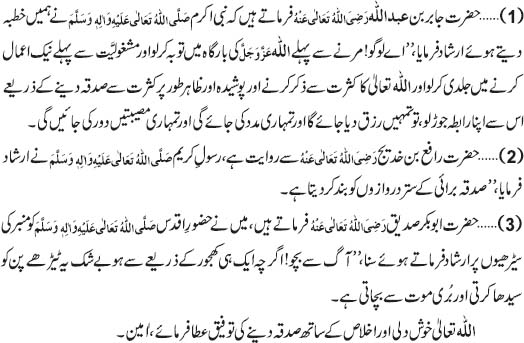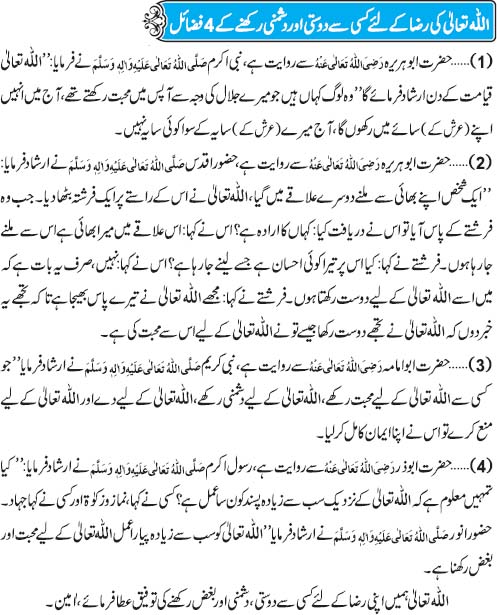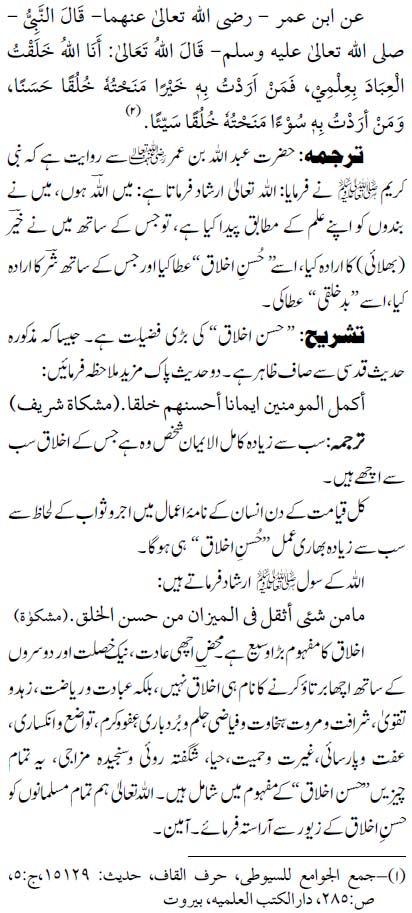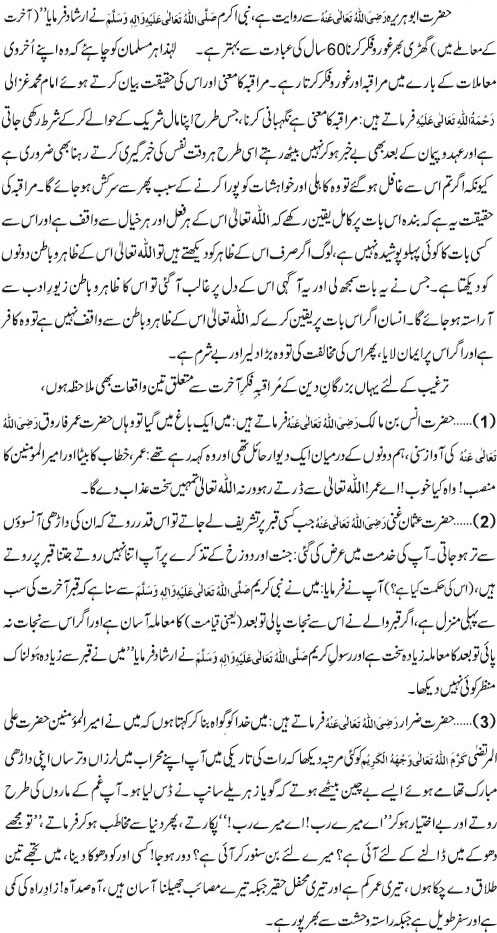
Roz e Juma Kay Fazail
Bad Consequences Of The Tongue
The Heart:
The most important part of the body is the heart as has been mentioned by our noble Prophet Muhammed (SAW) in his saying, “Indeed there is a piece of flesh in your body that, if it is sound, then the whole body will be sound and if it is corrupt then the whole body will be corrupt. Indeed it is the heart.” – Sahih al-Bukhari & Sahih al-Muslim
The heart is thus the port where all actions stem, whether good or evil. If the heart is good then the actions will be good and if the heart is corrupt then the actions will be bad. The heart is the place where Allah scans, as the Messenger of Allah (SAW) says, “Allah does not look at your bodies nor your faces but he scans your heart and actions.” – Sahih al-Muslim
As for the heart, Allah has commanded us to love Him and His Messenger, to love the righteous people, to love that which Allah loves, and to hate all which Allah hates. The tongue acts accordingly, because…. the tongue expresses what is in the heart.
The Tongue Expresses what is in the Heart:
If a person is good, it reflects in their saying. Allah has made it very easy for the tongue to move, and it is not difficult to realize that a person’s tongue moves much more compared to the limbs. So if a person is not careful about what he says, even a single saying of his can invalidate his actions. It is for this reason that the whole body warns the tongue saying, “Fear Allah concerning us, for we are (dependant) upon you. If you are upright then we will be upright and if you are corrupt then we will be corrupt.” – Sunan at-Tirmidhi, Mishkaat, Riyaadh as-Saleheen
And at the same time, the tongue is a great blessing from Allah. If we look at the animals, who are unable to speak, we realize the importance of this great tool of communication.
The gratitude that we should show for this great blessing should include, using it for obedience to Allah, for reading the Qur’an, for seeking Knowledge, to enjoin good, and forbidding evil. The prohibitions of the tongue are that you do not lie, abuse, use foul language, backbite and slander.
Allah says at the beginning of Soorah al-Mumineen, “Indeed successful are the Believers, those who in their prayer have Khushoo [humility/fear of Allah]” (fear of Allah) and those who refrain from vain talk.” [Soorah Mumineen : 1-3]
Here Allah mentions that refraining from vain talk is a sign of successful believers. Allah also mentions refraining from vain talk after he mentions al-Khushoo. This is because too much talk makes the heart hard. It is not possible to reach the level of Khushoo unless one refrain from vain talk.
Imaam an-Nawawee (RA) mentions “Know it is incumbent upon all to guard their tongues from most speech, except a word that has some benefit in it….” – Kitaabul-Adhkaar
And for those who take heed, there is a constant reminder in the verse, “Not a word is said except that there is a watcher by him ready to record it.” – [Soorah Qaf (50):18]
The Messenger of Allah, Muhammed (SAW) said, “Whoever believes in Allah and the Last Day should speak good or keep silent.”
Sadqa Denay Kay Fazail

Sadqa Denay Kay Fazail
The Honor Of The Masjid
Allah(SWT) says in the Qur’an: And the Masaajid are for the worship of Allah (alone) so invoke not anyone along with Allah (Surah Al-Jinn 72:18)
The renowned meaning of a Masjid is the place where Allah is Worshipped and that which is made waqf for Salaat. This is what we call a Masjid, if all the Masaajid are for the Worship of Allah then why do you go and worship others apart from Allah? The reality should be that the masaajid should be kept pure of Aqaaid-e-Fasidah (wrong beliefs) and Aamal-e-Baatilah (Wrong actions) (Maariful Qur’an)
It is related by Wassila bin el Asq’a(RA) that the Messenger of Allah (SAW) said: “Keep away from your Masjids:- your little children and the lunatics, and in the same way those who quarrel and those who speak loudly. (Ibn-i-Majah, Tabrani)
Imam Abul Hafz Siraj Ud-Din Al Ansaari(ra)(A.H 723- 804) states: it is not permissible for a guardian to bring a child/ lunatic who they know will urinate etc.. (in the place of prayer) to the Masjid. Otherwise, it is Makrooh. (Al Ashbah Wan Nathahir) Allamah Shami(ra) has also agreed with this statement of Abul Hafz.
It is related by Hasan Basri(ra) through Mursal, that Rasul Allah (SAW) said: ‘A time will come when the conversation of the people in the mosques will center around their worldly affairs. You must not sit with such people. Allah (SWT) has nothing to do with them. (Baihaqi, Shubu Iman)
Attachment to the Masjid is a sign of Faith
It is related by Abu Sa’eed Khudri (RA) that the Apostle of Allah said: “When you see that a person is attached to the Masjid and looks after it (devotedly), give the testimony of Faith for him because Allah says that only those who believe in Allah and the last day they are the ones who frequent the masjids of Allah and keep them occupied” (Tirmizi, Ibn-i-Maja, and Daarmi)
In the light of the above Hadith, it can be clearly understood that it is not just obligatory to ensure that the sanctity of the Masjid is preserved and we remain silent. Rather we should make it our duty not to entertain those who intend to harm our Masaajid.
The Masjid is a place of worship and a symbol of Faith. Sincere attachment to it, care and concern for its maintenance, and the desire to see it humming with the worship and the remembrance of Allah are thus the signs of true Faith. (Ma’ariful Hadith) May Allah Ta’ala protect the Imaan of our youth from this FITNAH. Aameen Al Kauthar
by Mufti Yusuf Danka
Allah Ki Raza Kay Liay Dosti Aur Dushmani Kay Fazail

Allah Ki Raza Kay Liay Dosti Aur Dushmani Kay Fazail
Allah Will Expiate Sins
Abu Hurairah (Allah be pleased with him) reported that Prophet (peace be upon him) said “Never a believer is stricken with a discomfort, an illness, an anxiety, a grief or mental worry or even the pricking of a thorn but Allah will expiate his sins on account of his patience”. [Source Al-Bukhari Book 32 H # 6243]
“Patience does not mean to passively endure. It means to be farsighted enough to trust the result of a process… What does patience mean? It means to Look at the Thorn and see the Rose, to look at the Night and see the Dawn.
Impatience means to be shortsighted as to not be able to see the outcome. The lovers of God never run out of Patience, for they know that Time is needed for the Crescent Moon to become Full.” {Subhan Allah}
Thankfulness and Patience
“Whatever happens in your life, no matter how troubling things might seem, do not enter the neighborhood of Despair. Even when all doors remained closed, ALLAH will open up a new path only for you. Be Thankful! It is easy to be thankful when all is well. But be thankful not only for what you have been given but also for all that you have been denied.
Hadith Qudsi: Husn e Akhlaq

Hadith Qudsi: Husn e Akhlaq
Why Our Hearts Must Engage In The Worship Of Allah
The heart dictates and the limbs obey. This is why Allah has made salvation in the Hereafter dependent upon the sanctity of the heart.
Islam prescribes many forms of worship that have outward expressions, prayer being the most obvious of these. Yet, the greatest, most important facets of worship are the internal ones – the devotions of the heart and of the inner self.
Allah says: {Set your face to the religion in true sincerity..} (30: 30)
To direct oneself to Allah, to rely on Him alone, and to seek His countenance through one’s deeds is the greatest form of worship there is.
This is what purifies and beautifies the heart, and it is accomplished through the love of Allah and being constantly aware of Him. This is the distinction that pious believers have over sinners and hypocrites.
Just as there are people who pay careful attention to their appearances but are neglectful of their inner selves, there are those who keep up a good outward image of religiousness and worship by doing supposedly pious acts conspicuously.
They are often most scrupulous in their religious observances, careful never to slip out of fear of public recrimination. Any slip would ruin their reputation because their status is built upon their being good imams, scholars, or Islamic workers.
For this reason, they are as conscientious as anyone could be in maintaining their outwardly good conduct, but not out of any real desire to please Allah. Instead, their hearts are full of the love of this world and the love of fame.
They are so concerned about their status and their reputation that they have no time to think about the Hereafter and how they should prepare for it. They have no time to think about the problems afflicting Muslims and how to solve them. They do not think about calling others to Islam.
Their hearts are devoid of the love of Allah and the love of his devoted worshippers. They also feel no fear of Allah. They do not hope for His reward. Their hearts, which are the receptacles of love, hate, hope, anger, joy, and sorrow, are not focused on the worship of Allah at all.
Allah describes the unbelievers in the following way: {This is because they followed that which displeased Allah and they hated to please Him, so He made their deeds of no effect.} (47: 28)
We should see how the heart is the crux of all matters. So what is the value of outwardly good works that are hated by the heart of the one who performs them?
What is the state of a person who abstains from some sinful deed for the sake of reputation or honor, while loving that deed in his heart and feeling joy when someone else commits it?
Such a person will almost invariably fall into sin sooner or later. When we bring to Allah a sound heart, we will find benefit in our wealth, our children, and our deeds.
Such a person, whose heart loves what Allah hates and hates what Allah loves, will without doubt sooner or later act upon the dictates of the heart.
The love or fear this heart harbors for some created thing – the fear of other people, of sickness, of poverty, of death, or of the rulers, and the desire for worldly gain, prestige, or position – will ultimately guide the body just as a monarch guides the populace.
Outward actions will take their direction from the heart. This is why the Prophet (peace be upon him) said: “In the body is a piece of flesh that if it is healthy, the whole body is healthy, and if it is corrupted, the whole body becomes corrupted. It is the heart.” (Al-Bukhari, 52)
The heart dictates and the limbs obey. This is why Allah has made salvation in the Hereafter dependent upon the sanctity of the heart. Allah says:
{The Day whereon neither wealth nor sons will prevail, except for him who brings to Allah a sound heart.} (26: 88-9)
When we bring to Allah a sound heart, we will find benefit in our wealth, our children, and our deeds. This is because our limbs would have already availed us. As for these who come to Allah with hearts that are dead or sick, they will find no benefit in anything else.
A person whose heart is devoid of the love and fear of Allah, whose heart has no affection for pious people and no love for righteous deeds, is to Allah a person who has no heart, even if the lump of flesh can be found beating in the chest.
Allah says: {Not alike are the living and the dead.} (35: 22)
The likeness of two people, one who remembers his Lord and one who does not, is that of the living and the dead. The comparison being made in this verse is that of a believer in Allah and an unbeliever, or that of a pious person and a sinner.
Allah says: {Can he who was dead to whom We gave life and a light whereby he can walk among the people be like him who is in the depths of darkness from which he cannot escape?} (6: 122)
The Prophet (peace be upon him) said: “The likeness of two people, one who remembers his Lord and one who does not, is that of the living and the dead.” (Al-Bukhari, 6407)
Allah says: {Verily in this is a message for any that has a heart.} (50: 37)
All of this confirms a great truth that we must pay attention to the purity of the heart and sincerity of purpose is the basis upon which all of our worship rests. If the heart becomes corrupted, good deeds are of no avail. When a person’s intention is no good, nobility of purpose is lost and the person swerves from what is right.
The Prophet (peace be upon him) said: “Actions are but by intentions”.
When he said this, he was talking about all his actions. The acceptability to Allah of any outward action is contingent on the intention behind it, as the Prophet (peace be upon him) said: “…and every person will have only what he intended.” (Al-Bukhari and Muslim,1)
They can be cause for reward even if the person possessing them does not perform any outward act. Actions of the heart, however, are a different matter. The heart’s deeds such as fear, hope, and love, differ from outward actions, in that they, being unseen by others, are not subject to the risk of being for show. They either happen for the sake of Allah or they do not happen at all.
One of the distinguishing features of the actions of the heart is that they can be caused for reward even if the person possessing them does not perform any outward act. When the Prophet (peace be upon him) was approaching Madinah on his return from Tabuk, he said to his Companions: “In Madinah, there are some people who did not travel nor did they even cross a valley, but they were with you.”
His Companions asked him: “O Messenger of Allah! How can this be while they were in Madinah?”
He replied: “Yes, while they were in Madinah and were prevented by circumstances from going forth.” (Al-Bukhari, 4423)
This idea was expressed by a poet who wrote about the pilgrimage:
O you who traveled to the Ancient House! It is thus,
That you went in the body while we went in spirit.
We were prevented by hardships we had to endure,
And thus we are like the ones who went forward.
The Prophet (peace be upon him) mentioned that there will be people who will enter Paradise without performing any good works because they were prevented from doing so.
Abu Hurayrah used to ask his peers to tell him about a man who went to Paradise without even having prayed a day in his life. When they could not answer, he would mention to them al-Usayrim from the tribe of Banu `Abd al-Ashhal. (Ahmad, 23634)
Al-Usayrim was a man who had refused to accept Islam when the rest of his people did so. On the day when the tribe of Quraysh attacked the Muslims in Madinah at Mount Uhud, al-Usayrim came to Madinah to accept Islam.
Then he picked up his sword and went out to join in the defense of the Muslims along with his kinfolk who had already accepted Islam. He fought until he was mortally wounded. After the battle, when the tribe of Banu `Abd al-Ashhal began looking for their dead, they found al-Usayrim on the verge of death. They were surprised because they had left him behind.
They asked him: “What made you come out here (to Madinah), your love for your kinfolk or a desire for Islam?”
He replied: “My desire for Islam brought me here. I believe in Allah and His Messenger so I accepted Islam. Then I picked up my sword and went forward with Allah’s Messenger and fought until I came to this.” He died shortly thereafter.
They mentioned this to Allah’s Messenger (peace be upon him) who said: “He is among the inhabitants of Paradise.” (Al-Haythami, Majma` al-Zawa’id(9/362). Al-Haythami states that all of its narrators are trustworthy (thiqat).
By Salman Al-Oadah
Muslim Scholar
Muraqabah Fikr-e-Akhirat

Muraqabah Fikr-e-Akhirat
Different Usages Of The Term ‘Sunnah’
Sunnah – literally meaning a way or path that is followed – has been used in different contexts in Islamic scholarship. Common Muslims, however, have come to understand it in a limited sense and they often get confused when it is used in varying contexts.
Here is how scholars of different Islamic expertise have used the term:
1. Jurists
Jurists who derive Islamic rulings have used the term Sunnah to distinguish between obligatory and recommended acts of worship. Generally speaking, deeds fall into five categories – Obligatory (Fard/Wajib), Recommended (Sunnah), Permissible (Mubah), Disliked (Makrooh), and Forbidden (Haraam). Jurists use the term Sunnah to describe deeds that are recommended to do but may not be obligatory. It is usually defined as a deed that a person is rewarded if he does, but is not sinful if he leaves it.
However, it must not be used as an excuse to abandon doing the Sunnah. A Muslim is required to adhere to the Sunnah as much as possible.
It is also used in the context of explaining the prohibition of bid’ah – innovation in the religion. That acts of worship must be upon the way – Sunnah – of the Prophet (peace be upon him). Any new acts of worship that are not from the Sunnah and are invented into the religion will be rejected.
2. Islamic legal theorists
Scholars of this specialization (Usool Al-Fiqh) are concerned with the foundations and the principles that form the basis for deriving rulings. In this context, scholars use the word Sunnah to distinguish its status as a primary source of Islamic knowledge along with the Qur’an. The Qur’an and the Sunnah are usually referred together as the sources of Islam pointing to the fact that both are revelations from Allah.
It is often thought that Qur’an alone is the revelation of Allah. It must be known that the commands of the Prophet (peace be upon him) are also solely based on revelation from Allah. In fact, Angel Jibreel would come down to teach the Prophet (peace be upon him) Sunnah just as he would teach him the Qur’an. The evidence for this can be found in the famous Hadith Jibreel. Furthermore, there are several verses and Ahadith that testify to this phenomenon.
3. Scholars of Hadith
Scholars of Hadith are primarily concerned about collecting every piece of information available with regard to the Prophet (peace be upon him). They refer to the term Sunnah in its broadest possible meaning – everything that the Prophet (peace be upon him) said, did, and tacitly approved of, and furthermore his physical characteristics, manners and customs, and biography are all included in the usage of the word Sunnah.
4. Aqeedah specialists
The word Sunnah was also used by scholars of Aqeedah with regard to articles of faith and referring them back to the early generation of Muslims. This was to distinguish between the pure beliefs of the early generation of Muslims and the innovative, false beliefs that swept into later generations.
Ref: Jamaal Al-Din Zarabozo, Authority of Sunnah

